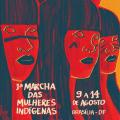Indigenous and Peasant Women Unite
 The Margarida's assembly expects an audience of 100,000 people in Brasília. The first March of Indigenous Women joins the peasants to fight social setbacks.
The Margarida's assembly expects an audience of 100,000 people in Brasília. The first March of Indigenous Women joins the peasants to fight social setbacks.
by Natália Loyola de Macedo
As a way of resisting the current political scenario, indigenous women decided to incorporate other movements. The first March of Indigenous Women and March of the Margaridas will occur simultaneously. The goal is to bring the largest number of people, especially women, to Brasília to demands rights and fight regressions. It is estimated that the country's capital will receive approximately 100,000 people on August 13 and 14. The first day of action will be aimed at indigenous communities and sympathizers of their struggles. The next day, the popular March of the Margaridas will take place.
Murdered by a landowner on August 12, 1983, Margarida's story encouraged the movement that would become Latin America's largest women's movement. Margarida's phrase “It is better to die in the fight than to die of hunger”, took shape and now unites women from the land, waters, and forests in Brasília.
During the Free Land Camp (Acampamento Terra Livre, or ATL), held in April, it was decided that these struggles would merge. For years, the March of the Margaridas has been expanding its demands for the working and marginalized women of Brazilian society in order to democratize the movement and make it more inclusive. The National Forum of Indigenous Women will begin on August 9. The idea is to discuss issues raised at this year's ATL. The schedule is not yet available.
“The Forum will make room for the issues that we have to prioritize within everything we will do. Hearing from women what they are bringing "from within" their states and municipalities. And what they have advanced, what still challenged them. We will be collecting [...] even for the government itself, for it, to put in place as public policy. Because the government is not doing the work of bringing women in and we are going to the government to present our demands.” Explains Rosimere Teles, Arapaço people from the Alto Rio Negro indigenous land in Amazonas, coordinating member of the Union of Indigenous Women of the Brazilian Amazon (União das Mulheres Indígenas da Amazônia Brasileira, or UMAB).
According to the issues raised in the ATL plenary, the motto of the first March “Territory: our body, our spirit” is supposed to raise issues that are essential in the struggle for the protection and maintenance of the land through the sustainable views of indigenous women. In addition, it also sets out to work on issues related to public health and education, issues that have needed greater attention due to the dismantling designed and executed by the Bolsonaro government. The Special Secretary of Indigenous Health, a fundamental agency in the qualified treatment of the native peoples, for example, has had difficulties carrying out its work.
The slogan chosen seeks to represent what is essential in the lives of indigenous women. “What does our body have to do with territory? Because the earth is part of our lives. We all depend on Nature. Everything exists within it.”, Rosimere comments. In addition, she adds that the land is a place where housing is built and food is produced, and that the spirits of indigenous peoples have sacred places. Rosimere also warns that taking care of mother earth is the same as taking care of the body.
Ro'Otsitsina Xavante, an indigenous leader, in an interview with El País, said that gender issues have been timidly joining the March, but these themes have been gaining ground in public debate over time. Due to cultural and temporal distinctions, the condition of indigenous women is addressed with great care in order to respect the peculiarities of each people and not to further the current colonization process. “We women are not part of the people, we are the people. Therefore, raping a girl, raping a woman, you are raping the people,” emphasizes Ro'Otsitsina Xavante.
Workshops fulfill the role of bringing discussions about violence and sexual abuse against indigenous women to the most interested parties. These women are in the process of understanding what it is and how certain aggressions operate. Violence against indigenous peoples is growing strongly in the country and the biggest victims end up being women and children.
In Brazil, there are indigenous women's organizations such as the Association of Indigenous Women Warriors of Rondônia; Union of Indigenous Women of the Brazilian Amazon; Xingu Women's Movement; among others. But, for the first time, the country will boast a nationally organized action for indigenous women to bring environmental, labor, and human rights issues to the country's capital.
With the slogan “Margaridas in the struggle for a Brazil with popular sovereignty, democracy, justice, equality, and freedom from violence”, the 13th and 14th are destined for another edition of the March of the Margaridas that occurs once every four years since the year 2000. The movement seeks to combat the different forms of violence committed against rural women and it is becoming increasingly democratic by providing space for voices from forests and waters.
The second week of August is coming so that the indigenous women of Brazil, together with peasant women, the people responsible for producing the food that Brazilians have on the table, can resist the current colonization process in the search for more visibility and respect in society.
Translated by Patricia Pou Jové
For an additional report on the Indigenous and Peasants Women's with additional photos, click HERE.
